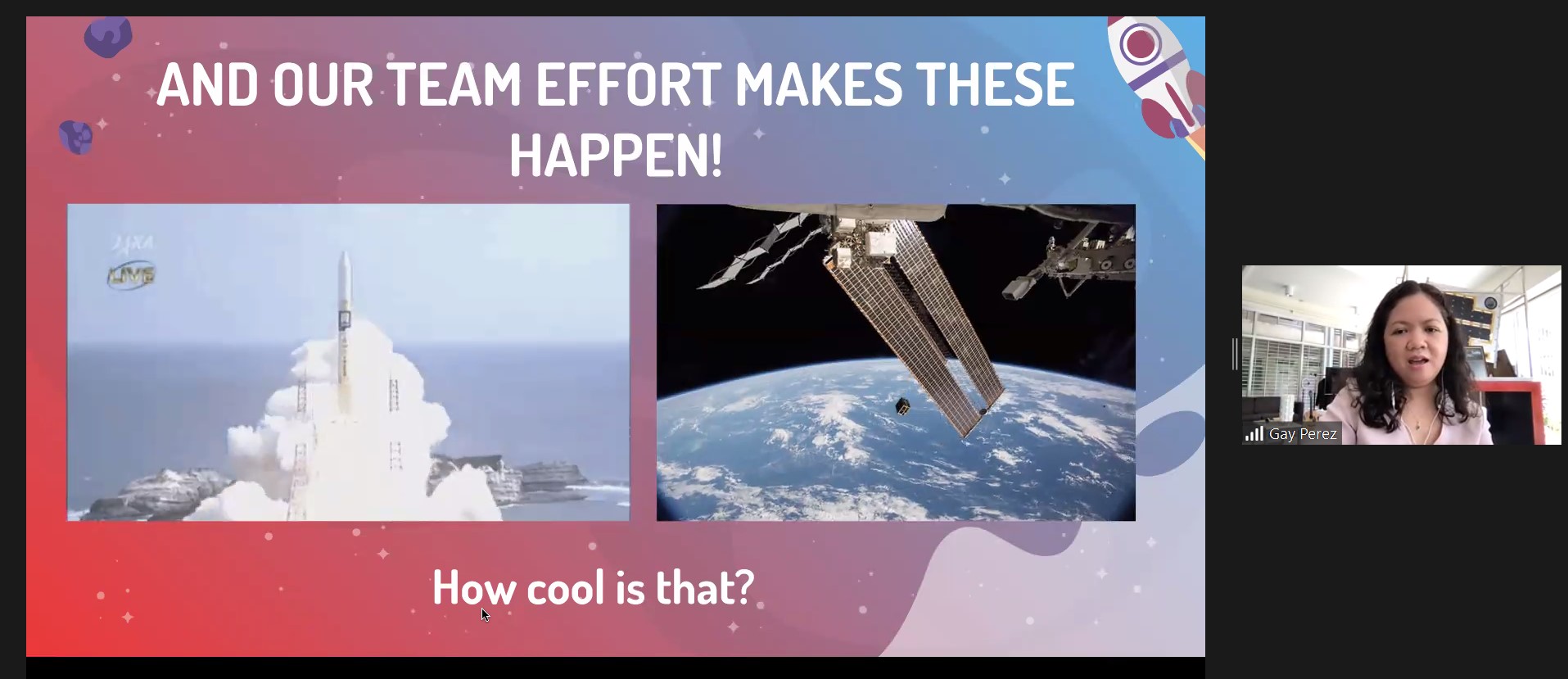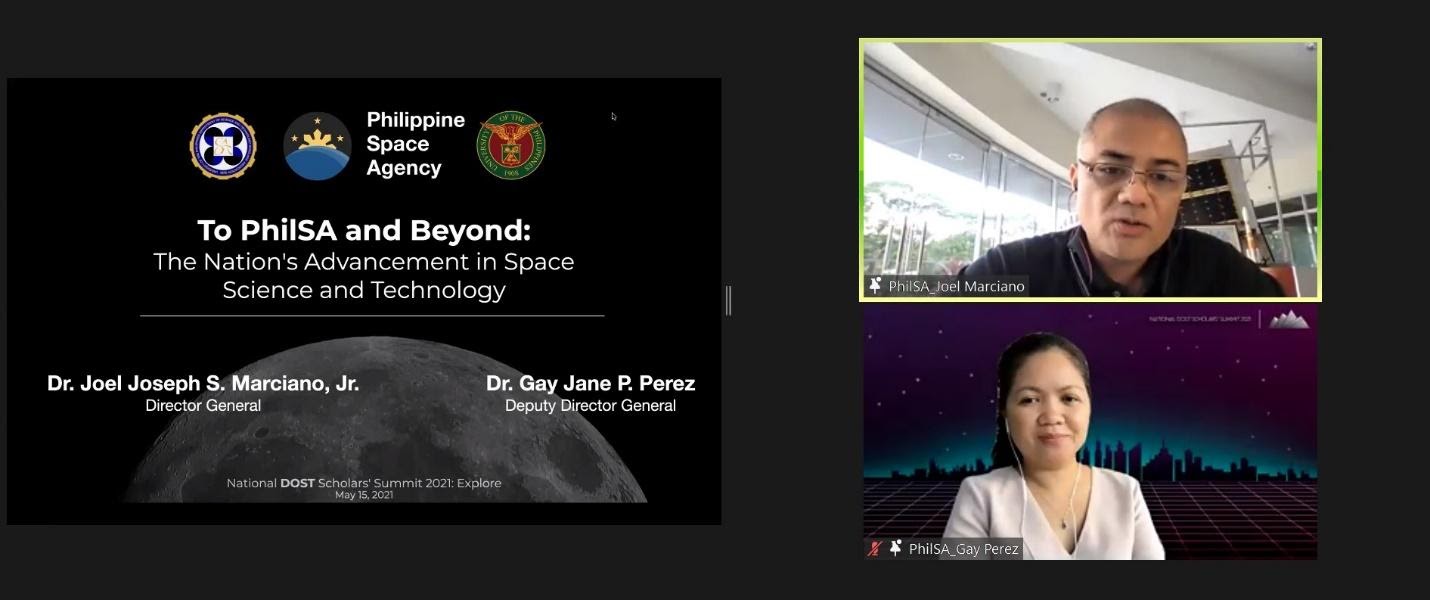Philippine Space Agency (PhilSA) Director General Dr. Joel Joseph Marciano encouraged Department of Science and Technology (DOST) scholars participating in the National DOST Scholars Summit (NDSS) 2021 Explore virtual conference to pursue an advanced degree as part of a commitment to innovation, excellence and public service.
In the virtual conference attended by over 200 STEM students, Dr. Marciano, who obtained his BS in Electrical Engineering from the University of the Philippines (UP), his PhD in Electrical Engineering and Telecommunications from the University of New South Wales in Australia and pursued postdoctoral studies at the University of California through DOST and UP funding, explained how obtaining a doctoral degree is “an incremental, yet substantive, contribution to the pool of knowledge of humankind…to expanding the collective understanding of our world.”
“Let us not think of it as our life’s work, because that is a canvas that’s continuously being painted… treating grad studies and PhD as our life’s work will likely mean that we will never complete it. What is really more important is what one does after one completes a PhD,” says Dr. Marciano. “(So) keep pushing, because the new knowledge that you may have come up with and the problem that you solved in your PhD may yet be a stepping stone to solving a bigger problem, such as developing a cure for a formidable disease, or ending a pandemic,” he adds.
According to Dr. Marciano, doing a PhD deepens one’s knowledge and skills, and earning the degree is key in building a career in highly technical fields such as in space science and technology. The space agency chief also underscored the social value of building relationships with fellow PhD students, citing its importance when tapping fellow experts for future collaborations.

Dr. Marciano discussing the value of earning a doctorate degree to NDSS 2021 Explore participants.
Become a T-shaped person, join PhilSA
A “T-shaped individual,” Dr. Marciano explains, is “someone who has achieved a certain depth of knowledge and skill in his or her field of expertise”. This depth is symbolized by the “vertical bar” of the “T”. The “horizontal bar,” meanwhile, represents the ability of this person to communicate, collaborate, manage a project, apply knowledge in areas outside one’s expertise, and empathize. According to Dr. Marciano, societal and global-scale challenges can be more effectively dealt with by a deep and broad front of competencies formed by T-shaped individuals and institutions working together.
His challenge to students wanting to be part of the exciting field of space science and technology: “We have room for you but we need you to stay the course…do your masters, and your PhD, too. Our human resource build up efforts are geared towards trying to find the best T-shaped individuals who are dedicated to lifelong learning, collaboration, excellence and integrity to match (PhilSA’s) pioneering and growing operations.”
Space career limited to physics, engineering majors?
“Certainly not,” says PhilSA Deputy Director General and physicist Dr. Gay Jane Perez during the open forum.
Dr. Perez clarified that space science and technology is “highly multidisciplinary” and other sciences such as biology, marine science, geology, and chemistry, among others, intersect with this field.
“The social sciences, law, economics, communication – these are all very important disciplines (to space science and technology). We should not just know our engineering and sciences, we should be able to communicate it,” Dr. Perez added.
“Don’t stop asking questions”
Hours before addressing STEM students at the NDSS 2021 Explore, Dr. Perez was at a webinar for kids organized by the University of the Philippines Diliman College of Science.
25 curious kids joined the interactive, educational Zoom session titled, “Universe Unveiled.” Dr. Perez took them to an outer space adventure to show how satellites are put into orbit and how these “computers” make life on Earth more convenient.
The deputy chief of the country’s space agency explains, information gathered by satellites from watching over the planet allows humans to navigate modern living easier—from tracking food delivery orders to monitoring whether we would have enough water supply during this dry season.
During her presentation, she introduced the kids to the interesting work of scientists like her who tinker in laboratories to send satellites to space. She likewise showed them the work involved in checking data from satellites with information from the ground.

Dr. Perez talks about the exciting collaborative work of scientists sending satellites to space.
“We’ve come a long way from looking up. Now we’re looking down, seeing our beautiful planet,” Dr. Perez emphasized.
Dr. Perez adds, this would not be possible without scientists who tirelessly asked questions, worked together, and looked for answers. “Don’t stop asking questions,” Dr. Perez told the kids. She believes that this is the ultimate secret to unlocking the universe through science.
-30-




